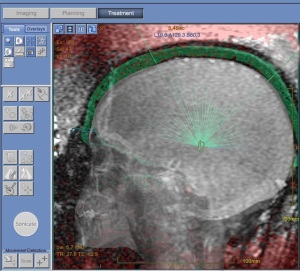por
John R. Fischer, Senior Reporter | January 31, 2019

Ohio State researchers are launching
a first-in-world clinical trial to
use focused ultrasound to treat
epilepsy
Epilepsy patients whose seizures cannot be controlled with medication may be one step closer to an alternative treatment.
Researchers at the Ohio State University College of Medicine are set to launch a first-in-world clinical trial that will oversee the effect of focused ultrasound surgery on adults with the “medical refractory lobe focal onset” type of epilepsy. The team applied the technology earlier this month on a man with the condition.
“We’re pursuing this clinical trial because we know there’s a large, unmet clinical need. More than 20 million people worldwide live with uncontrollable seizures because no available treatment works for them,” neurosurgeon Dr. Vibhor Krishna, who is leading the study at The Ohio State University Wexner Medical Center and Ohio State’s Neurological Institute, said in a statement. “Our goals are to test the safety of this procedure and study changes in seizure frequency in these patients.”



Ad Statistics
Times Displayed: 16169
Times Visited: 33 Final days to save an extra 10% on Imaging, Ultrasound, and Biomed parts web prices.* Unlimited use now through September 30 with code AANIV10 (*certain restrictions apply)
Epilepsy is the fourth most common neurological condition and one that affects 65 million people of all ages worldwide, including 3.4 million in the U.S., according to the Epilepsy Foundation. Severity of the condition falls on a spectrum consisting of a wide range of seizure types, including focal onset (partial), and general.
Researchers recently used the technology on a 58-year-old man from Dublin, Ohio, conducting the three-hour surgery in an intraoperative MR-surgical suite. To keep the patient still, the team placed a head frame with an ultrasound transducer attached around his head, which was surrounded by a bath of cold, degassed, circulating water.
During the procedure, the MR machine transmitted ultrasound through the intact skull focused at the exact brain tissue that was targeted for ablation, with the patient awake and alert to provide real-time feedback. This helped the team safely ablate the area of the brain involved in the spread of epilepsy without the occurrence of any undesirable side effects.
“For the past several years, Ohio State has been leading the way in conducting clinical trials using focused ultrasound surgery to successfully treat essential tremors and Parkinson’s disease. Our research team is now pioneering this innovative technology to help our patients who suffer from debilitating epileptic seizures,” Dr. K. Craig Kent, dean of the College of Medicine, said in a statement.
The clinical trial is funded by the Focused Ultrasound Foundation.

